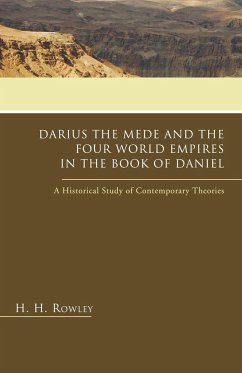
Darius the Mede and the Four World Empires in the Book of Daniel
Versandkostenfrei!
Nicht lieferbar
The present study is limited to the related questions of Darius the Mede and the Four World Empires of Nebuchadnezzar's dream and of Daniel's first vision. So far as Darius the Mede is concerned, it is still generally agreed within the critical school that he has no place in history, and that he is a fictitious creation out of confused traditions. But anti-critical orthodoxy has not given up the attempt to find a place in history for him. . . . So far as the Four World Empires are concerned, the issue is not between critical orthodoxy and anti-critical orthodoxy. For here almost every solution...
The present study is limited to the related questions of Darius the Mede and the Four World Empires of Nebuchadnezzar's dream and of Daniel's first vision. So far as Darius the Mede is concerned, it is still generally agreed within the critical school that he has no place in history, and that he is a fictitious creation out of confused traditions. But anti-critical orthodoxy has not given up the attempt to find a place in history for him. . . . So far as the Four World Empires are concerned, the issue is not between critical orthodoxy and anti-critical orthodoxy. For here almost every solution which is proposed . . . goes back far beyond the foundation of the critical school. . . . The present study will therefore be limited to the consideration of theories . . . which have appeared in writings published within the present century, but will take into account the advocacy of those theories both before and during this century. It will aim to determine which of these theories may be accepted, and to show why those rejected are untenable. It will also aim to strengthen the defences of the positions adopted against the many challenges which surround them, and to advance fresh considerations for their support. --from the Introduction H. H. Rowley (1890-1969) was one of the leading Old Testament scholars of the twentieth century. After serving with the Baptist Missionary Society in China and teaching for sixteen years in Wales, he was Professor of Semitic Languages at the University of Manchester. Among his many publications are 'The Relevance of Apocalyptic,' 'The Re-discovery of the Old Testament,' 'The Biblical Doctrine of Election,' 'From Joseph to Joshua,' 'The Faith of Israel,' 'From Moses to Qumran, and 'Worship in Ancient Israel.'



